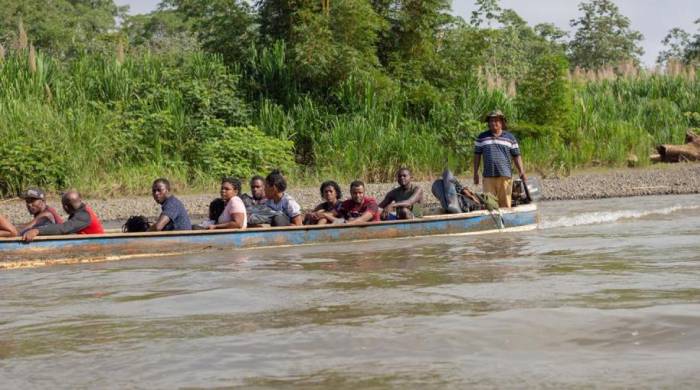The DARIEN disaster needs to be addressed by ALL of the candidates.
- By : James Bryson
- Category : Darien, Human Interest, Immigration

The Ombudsman’s Office, with the support of the office of the United Nations High Commissioner for Human Rights, issued a bulletin with the results of interviews carried out in Darién, on the human rights situation of irregular migrants and refugees who arrive. to the province.
The number of migrants and refugees traveling through the Darien has seen an increase of more than 20% in the first months of 2024, compared to the same period last year. The report from the Ombudsman’s Office counted between January and February 2024 more than 72 thousand people who crossed through the border jungle between Panama and Colombia. But until mid-April, the figure exceeded 110,000, which indicates a more congested route than ever before, even than in 10 years combined, motivated in part by the elections in the United States in November, and a high possibility that the Republicans return to power with anti-immigration policies.
The results of the interviews reveal worrying patterns of sexual violence abuses, mainly against women. One in five women interviewed knew of cases of sexual violence against other people. Additionally, 17 women said they were asked for sexual favors in exchange for their safety or some other benefit. One fact that stands out is that almost 70% observed lifeless bodies during the journey, within the Darién jungle, nicknamed with all the synonyms that refer to hell itself. According to the Ombudsman’s Office, 86% of those questioned did not receive any type of information upon arriving at the temporary immigration station, 56% said they felt insecurity during their stay, 15% suffered discrimination and 10% were victims of robbery. most by other migrants.
The immigration situation represents a challenge for the Panamanian authorities. Despite the financial and personnel efforts allocated to attend the immigration stations, nothing seems to be enough. Every day there are new demands, a greater number of travelers which translates into more resources for the country that temporarily hosts them.
Recently, in a media conference with her Colombian counterpart, Panamanian Foreign Minister Janaina Tewany requested more economic resources, more aid, from the countries of the region and directly from the nations linked to the issue, to be able to address the magnitude of the problem. In 2023, the Panamanian State invested $70 million, according to data from the National Immigration Directorate, in meals, personnel and other needs, to serve the migrant population. Despite the number, there is something even more challenging: discouraging migrants from using the Darién route, the forested bridge between two continents that consists of 575 thousand hectares, and which was declared World Heritage by UNESCO for its exceptional variety. of species. Despite network campaigns, organized crime has the advantage. On the Colombian side, dominated by the Gulf Clan, it offers “packages” of different prices to migrants to cross the border, as if they were tourist offers.
At the same time, it is one of the most dangerous routes on the way to the North. On repeated occasions, the Director of Immigration, Samira Gozaine, has stated that Darién should not be the route to reach the United States, precisely because of the dangers that travelers face.
The Ombudsman’s survey says that one in five migrants said they had suffered mistreatment from security forces. 66% indicated that the main hygiene needs are not covered in the temporary stations, nor do they have privacy (61%), that there is no separate space (48%), 20% said that food needs were not covered and a 15% spoke about medical care. Another finding is that people are in “de facto mobility restriction”, and that an overcrowding situation was observed at the Lajas Blancas station.
The host communities are usually towns of indigenous origin, remote from national development, where there are no aqueducts, drinking water, much less sewers or sanitary systems. Difficult to access areas that have not had the attention of governments on a continuous basis. Darién is the province in the country with the highest levels of poverty, which exceed 43%, according to the report on poverty and extreme poverty (2022) of the Panama without Poverty initiative. The main water sources of the Darien communities are usually the nearby rivers. In general, remote areas do not have Internet coverage, this has led indigenous people to hire the services of Starlink, who in turn rent time to migrants. In situations where visitors reach five times the number of people who live there, it is even more challenging to offer services that its inhabitants lack.
Another impediment that the Ombudsman’s Office highlights in its report refers to the absence of prosecutor’s staff or officials in the temporary stations that can receive reports of crimes. According to the stories collected, some people expressed interest in withdrawing the complaint due to the long waiting time at the temporary stations, as well as the lack of access to services for the victims or their families.
The Ombudsman’s Office visited Darién between February 19 and 23 together with the Regional Office for Central America of the United Nations High Commissioner for Human Rights with the purpose of learning about the situation of migrants who cross the dangerous jungle, in addition to the Temporary Migration Reception Stations (ETRMs) and in the host communities. To do this, they conducted 205 random interviews in the Migrant Reception centers, although without claiming to be representative of the population as a whole. Most of those questioned were Venezuelans (77%), followed by Colombians (10%), then Ecuadorians and Peruvians. 97% of them were destined for the United States.



No Comments